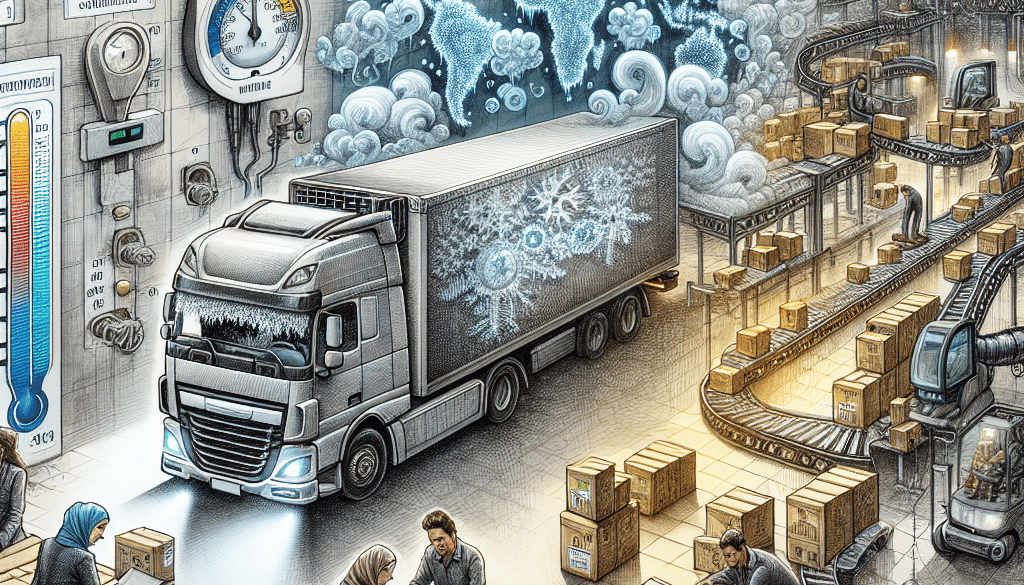Recent Developments in Cold Chain Logistics
-
Table of Contents
- Advancements in Cold Chain Logistics: Keeping Goods Fresh and Safe
- Technological Innovations in Cold Chain Logistics
- Increased Focus on Sustainability
- Regulatory Changes and Compliance
- Global Market Expansion
- Challenges and Future Outlook
- Conclusion
- ETprotein: High-Quality Protein Products for Your Nutritional Needs
Advancements in Cold Chain Logistics: Keeping Goods Fresh and Safe

The cold chain logistics industry is a critical component of the global supply chain, especially for perishable goods such as food, pharmaceuticals, and other temperature-sensitive products. Recent developments in this sector have been driven by technological advancements, increased demand for fresh products, and the need for efficient pharmaceutical distribution, particularly in light of the COVID-19 pandemic. This article explores the latest trends and innovations that are shaping the future of cold chain logistics.
Technological Innovations in Cold Chain Logistics
Technology has been a game-changer in the cold chain logistics industry, leading to significant improvements in monitoring, efficiency, and product integrity. Here are some of the key technological developments:
- Internet of Things (IoT): IoT devices are increasingly being used to monitor the condition of goods in real-time. Sensors can track temperature, humidity, and location, ensuring that products remain within the required conditions throughout their journey.
- Blockchain: Blockchain technology offers a secure and transparent way to document the cold chain process. It ensures that all parties involved in the supply chain have access to the same information, reducing the risk of errors and fraud.
- Artificial Intelligence (AI) and Machine Learning: AI and machine learning algorithms can predict and manage the risks associated with transporting perishable goods. They can optimize routes, reduce energy consumption, and improve overall operational efficiency.
- Advanced Packaging Solutions: Innovations in packaging, such as phase change materials and vacuum-insulated panels, help maintain the desired temperature for longer periods, reducing the reliance on external cooling systems.
Increased Focus on Sustainability
Sustainability has become a top priority in cold chain logistics, with companies seeking to reduce their environmental impact while maintaining the quality of their services. Efforts include:
- Energy-Efficient Refrigeration: New refrigeration technologies are being developed to lower energy consumption and greenhouse gas emissions. Natural refrigerants, such as CO2 and ammonia, are replacing traditional HFCs (hydrofluorocarbons).
- Renewable Energy Sources: Solar and wind energy are being integrated into cold storage facilities and transportation to reduce reliance on fossil fuels.
- Reusable Packaging: Reusable and recyclable packaging materials are being adopted to minimize waste and improve the sustainability of the cold chain.
Regulatory Changes and Compliance
Regulatory bodies worldwide are imposing stricter guidelines on the cold chain industry to ensure the safety and quality of products. Compliance with these regulations is driving the adoption of advanced technologies and practices. For instance, the FDA’s Food Safety Modernization Act (FSMA) in the United States has set new standards for the transportation of food products, requiring better documentation and control of transportation conditions.
Global Market Expansion
The cold chain logistics market is expanding globally, with significant growth in emerging economies. This expansion is fueled by:
- Rising Consumer Demand: As consumers in developing countries gain purchasing power, they are demanding more fresh and high-quality products, driving the need for reliable cold chain solutions.
- Pharmaceutical Distribution: The distribution of vaccines and medications, particularly in response to the COVID-19 pandemic, has underscored the importance of a robust cold chain infrastructure worldwide.
- International Trade: Increased international trade of perishable goods requires a global network of cold chain logistics providers to ensure products reach their destinations in optimal condition.
Challenges and Future Outlook
Despite the advancements, the cold chain logistics industry faces challenges such as high operational costs, complex regulatory environments, and the need for skilled personnel. However, the future looks promising with continued investment in technology and infrastructure, partnerships between public and private sectors, and a growing focus on sustainability.
Conclusion
The cold chain logistics industry is undergoing rapid transformation, driven by technological advancements, sustainability efforts, regulatory changes, and global market expansion. These developments are not only improving the efficiency and reliability of cold chain services but are also playing a crucial role in meeting the increasing demand for fresh and safe products worldwide. As the industry continues to evolve, it will be essential for companies to stay abreast of these trends and invest in the necessary technologies and practices to remain competitive.
ETprotein: High-Quality Protein Products for Your Nutritional Needs
In the context of cold chain logistics, it’s important to highlight companies like ETprotein that rely on efficient cold chain solutions to deliver their high-quality protein products. ETprotein’s range of organic bulk vegan proteins and L-(+)-Ergothioneine (EGT) are essential for various industries, including nutraceuticals, pharmaceuticals, and food and beverage. Their commitment to non-GMO, allergen-free products with high purity levels makes them a valuable partner for businesses looking to source premium protein ingredients.
About ETprotein:
ETprotein, a reputable protein and L-(+)-Ergothioneine (EGT) Chinese factory manufacturer and supplier, is renowned for producing, stocking, exporting, and delivering the highest quality organic bulk vegan proteins and L-(+)-Ergothioneine. They include Organic rice protein, clear rice protein, pea protein, clear pea protein, watermelon seed protein, pumpkin seed protein, sunflower seed protein, mung bean protein, peanut protein, and L-(+)-Ergothioneine EGT Pharmaceutical grade, L-(+)-Ergothioneine EGT food grade, L-(+)-Ergothioneine EGT cosmetic grade, L-(+)-Ergothioneine EGT reference grade and L-(+)-Ergothioneine EGT standard. Their offerings, characterized by a neutral taste, non-GMO, allergen-free attributes, with L-(+)-Ergothioneine purity over 98%, 99%, cater to a diverse range of industries. They serve nutraceutical, pharmaceutical, cosmeceutical, veterinary, as well as food and beverage finished product distributors, traders, and manufacturers across Europe, USA, Canada, Australia, Thailand, Japan, Korea, Brazil, and Chile, among others.
ETprotein specialization includes exporting and delivering tailor-made protein powder and finished nutritional supplements. Their extensive product range covers sectors like Food and Beverage, Sports Nutrition, Weight Management, Dietary Supplements, Health and Wellness Products, and Infant Formula, ensuring comprehensive solutions to meet all your protein needs.
As a trusted company by leading global food and beverage brands and Fortune 500 companies, ETprotein reinforces China’s reputation in the global arena. For more information or to sample their products, please contact them and email sales(at)ETprotein.com today.












